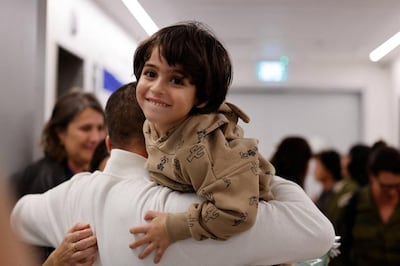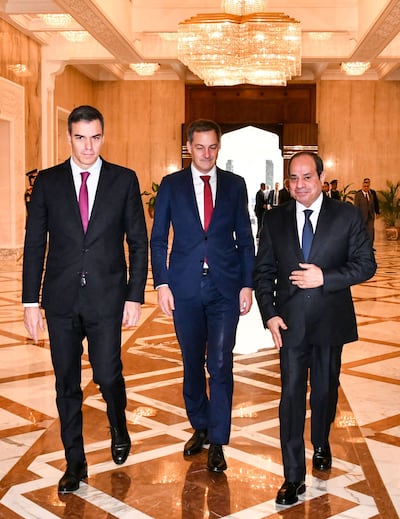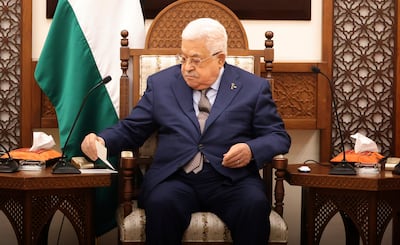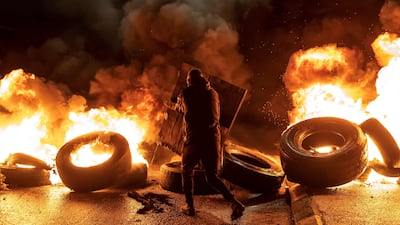Live updates: Follow the latest news on Israel-Gaza
Frantic international efforts to extend the Gaza truce may have little long-term impact, officials and observers have said.
Dismissing the idea that long-stalled peace talks could resume any time soon, they said that ongoing diplomatic efforts are chiefly focused on hostage and detainee exchanges between Hamas and Israel.
Last-ditch efforts to extend a four-day truce in Gaza have been a success, according to Majed Al Ansari, Qatar's Foreign Ministry spokesman, who said on social media platform X that the truce would be extended by two days, in a post late on Monday.
But Israel, diplomats say, has a steely determination to defeat Hamas, despite the staggering toll the war has taken on Gaza and growing calls for a ceasefire.
Of the five wars Hamas and Israel have fought since 2008, the latest is the deadliest by far, killing at least seven times the roughly 2,000 Palestinians who died in the 50-day 2014 war.
Its regional repercussions are also far reaching and threaten to ignite other fronts, chiefly in Lebanon, where at least 1,200 people were killed in the 2006 Hezbollah-Israel war. Analysts say a new war there would likely be far more destructive.
The four-day truce that took effect on Friday has come as a welcome reprieve. Efforts are under way to extend the truce, maybe by as long as five days, after the two sides released hostages and detainees, with 41 Israelis freed in exchange for 117 women and children jailed in Israel.
Those figures could rise significantly if the deal is extended.
Endgame in Gaza
Israel says it will resume operations in Gaza when Hamas stops releasing hostages to realise its declared goal of wiping out the group's military capabilities and ending its 16-year rule of the tiny enclave.
That, according to the officials and diplomats who spoke to The National, will eventually diminish into a low-intensity and drawn-out war between the two enemies that will not give Israel the security it craves, revive long-stalled peace negotiations or loosen Hamas's grip on Gaza.
“The Israelis might change the modalities of their military operation in Gaza if the war continues on an open-ended basis,” said Mohammed Anis Salem, a former Egyptian diplomat who now sits on the Egyptian Council of Foreign Affairs, a Cairo-based think tank.
“They can shift to long-term, selective strikes similar to what they have been doing against Iranian-backed armed groups in Syria.
“Resuming the war on the scale we've seen in the last seven weeks might prove difficult given that the licence given to Israel by the US to pursue its goals in Gaza has become much more conditional now, chiefly repeated calls to heed international law and avoid civilian casualties.”
Following the Hamas attack on October 7 that killed 1,200, Israel's deadliest day since its creation 75 years ago, its government is unlikely to heed calls for a permanent suspension of military operations in Gaza, according to officials and diplomats familiar with the inner workings of the conflict.
Speaking to The National, former Jordanian Information Minister Samih Maaytah said no one should expect momentum towards peace from the four-day truce or its extension.
“The humanitarian pauses will not be a conduit for a permanent ceasefire at this stage,” he said.
“Its details are centred on an exchange of prisoners and the flow of humanitarian aid” instead of laying the foundation for a ceasefire or a revival of the long-dormant peace process.
“I think the war will take a long time to play out. No one can determine how long but it will not be soon,” he added.

A senior European diplomat who was on a recent fact-finding mission to Israel said that expecting any change to the devastating nature of the Israeli operation in Gaza is wishful thinking.
“There seems to be no real pressure, at least from the Europeans, to change the kind of warfare continuing in Gaza. Some Europeans are more critical but, of course, Israel does not take them seriously,” he said.
He said US President Joe Biden and Secretary of State Antony Blinken still stand by Israel but they are walking a fine line, making clear to Prime Minister Benjamim Netanyahu's right-wing government that Washington's support is not unconditional.
Mr Netanyahu, he said, needed a long war to delay an expected investigation into the failures that had allowed Hamas to march relatively easily into southern Israel on October 7.
But others who see a glimmer of hope that the truce could lead to something more meaningful.
Speaking in Barcelona on Monday at the Forum for the Union of the Mediterranean, an annual gathering of countries on the periphery of the EU, the bloc's foreign policy chief Josep Borrell said the truce “should be extended to make it sustainable and long lasting while working for a political solution”.
Such upbeat comments have been circulating in Middle East capitals for weeks, notably by Egyptian President Abdel Fattah El Sisi, whose country in 1979 became the first Arab nation to sign a peace treaty with Israel.

The Egyptian leader has forged close relations with Israel since taking office nine years ago, with security and counter-terrorism co-operation the main features of those ties.
But he has been scathingly critical of Israel over the high death toll among Palestinian civilians in Gaza and what he sees as its scheme to push Gazans into resettlement in Egypt's Sinai Peninsula.
Significantly, he has also been talking up the long-held proposition of creating a Palestinian state in the Gaza Strip and the occupied West Bank with East Jerusalem as its capital.
The proposal, known as the “two-state solution”, has been gathering dust for years, with West Bank Jewish settlements rapidly expanding, peace negotiations shelved and Mr Netanyahu, Israel's longest-serving prime minister, in no mood to make concessions.
But Mr El Sisi has found welcome support for his calls for a revival of the peace process in the position of the leaders of Spain and Belgium when they visited him in Cairo last week.
The three leaders voiced their support for the two-state solution, which they said was needed more than ever.
“We have to move towards the two-state solution to achieve peace. Any solution must be a final one to end the Arab-Israeli conflict,” said Belgian Prime Minister Alexander De Croo.
Underlining Israel's resolve to press on with its military operation in Gaza, Israel swiftly responded to the European leaders' comments by summoning their ambassadors last weekend for “a harsh rebuke conversation”, according to Israeli Foreign Minister Eli Cohen.

The four-day truce was negotiated by Egypt and Qatar – the two Arab countries most connected with Hamas – as well as the US, Israel's staunchest western supporter and an ally of both Cairo and Doha.
In recent days, representatives of the three nations have been meeting in Ramallah, first to hammer out the details of the truce and to remove last-minute obstacles to its implementation.
However, the Ramallah meetings, as in previous ones in Cairo and Doha, have also touched on the future of post-war Gaza, according to Egyptian officials briefed on the meetings.
Representatives from the Palestinian Authority, which has been at odds with Hamas for close to two decades, attended some of these meetings, they said.
“The Americans want the Palestinian Authority strengthened and enabled to run Gaza,” said one of the officials. “They don't want Hamas in the picture going forward.”

